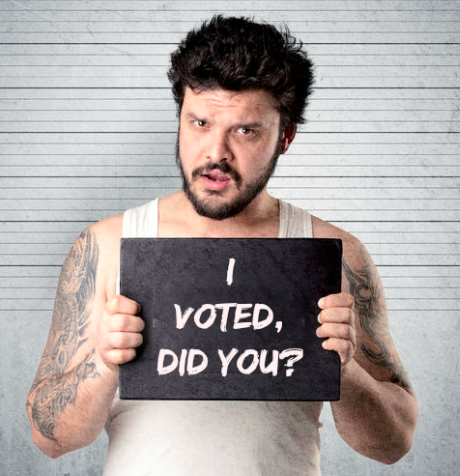MORAL TURPITUDE IS STILL A DEAL-KILLER FOR CASTING A BALLOT … OR IS IT?
Rep. George Rauscher, District 9, flagged the Division of Elections last month after one of his constituents noticed something suspicious: A felon with a “moral turpitude” crime on his recent record was listed as having been able to vote.
That someone was not eligible to vote due to the nature of his crimes.
Rauscher called the Elections Office immediately, and wasn’t satisfied with the response. But ultimately he was able to get the answer to his question: The felon had indeed been able to cast a ballot in the primary.
The division told him that state workers had to look people up on CourtView one at a time to determine if they were ineligible to vote.
Incredulous, Rauscher contacted the Department of Corrections to find out why they didn’t simply send the lists of ineligible felons to the Division of Elections, like they always have done in the past.
The response was surprising:
“Regarding your inquiry about data DOC shares with Division of Elections for voting eligibility- while DOC historically has provided a bi-monthly data transfer of felons to the division, DOC received an email in February of this year from the division saying they no longer needed our data. Thus, we have not provided any information to the Division of Elections since February.”
In other words, the Division was now just going to register all to vote, regardless if they were eligible. The Permanent Fund automatic voter registration was all the Walker-Mallott Administration needed.
RAUSCHER CALLS FOR INVESTIGATION
Rauscher has formally requested that the Alaska Division of Elections investigate whether other felons who have had their voting right revoked, were in fact listed on the voter roll and able to vote Aug 21.

With the Permanent Fund automatic registration program, it’s possible that felons are simply being signed up as voters.
How many are legally allowed to vote, and how many simply assume they can vote because the Division has imported their data from the Permanent Fund Division, without cross-checking the data from the Department of Corrections?
Rauscher wants to know.
“Protecting the integrity of Alaska’s election process is of the utmost importance,” he said.
The Sutton representative has also asked for a statewide review of all precinct lists and that the Division of Election removes ineligible people before the November election.
Although the Division of Elections quickly removed the one felon’s name from the District 9 voter rolls, once alerted to the fact by Rauscher, “the fact that even one ineligible felon was erroneously considered eligible to vote deeply concerns me,” he said. “I urged the Division of Elections to take action as quickly as possible.”
WHAT IS A MORAL TURPITUDE CRIME?
In Article V, Section 2, of the Alaska Constitution, conviction for a felony involving moral turpitude results in a loss of voting rights, although there is a mechanism for restoration. It’s not automatic. By law, after the sentence is completed, an individual must re-register with the Division of Elections.
A list of crimes defined as involving moral turpitude appears under AS 15.060.010. It includes nearly all felony-level crimes, such as homicide; manslaughter; assault; stalking; kidnapping; sexual assault; sexual abuse of a minor; unlawful exploitation of a minor; robbery; extortion; coercion; theft; burglary; arson; criminal mischief; forgery; criminal impersonation; bribery; perjury; unsworn falsification; interference with official proceedings; witness tampering; jury tampering; terroristic threatening; possession or distribution of child pornography; unlawful distribution or possession for distribution of a controlled substance; unlawfully furnishing alcohol to a minor, and felony possession of a controlled substance.
